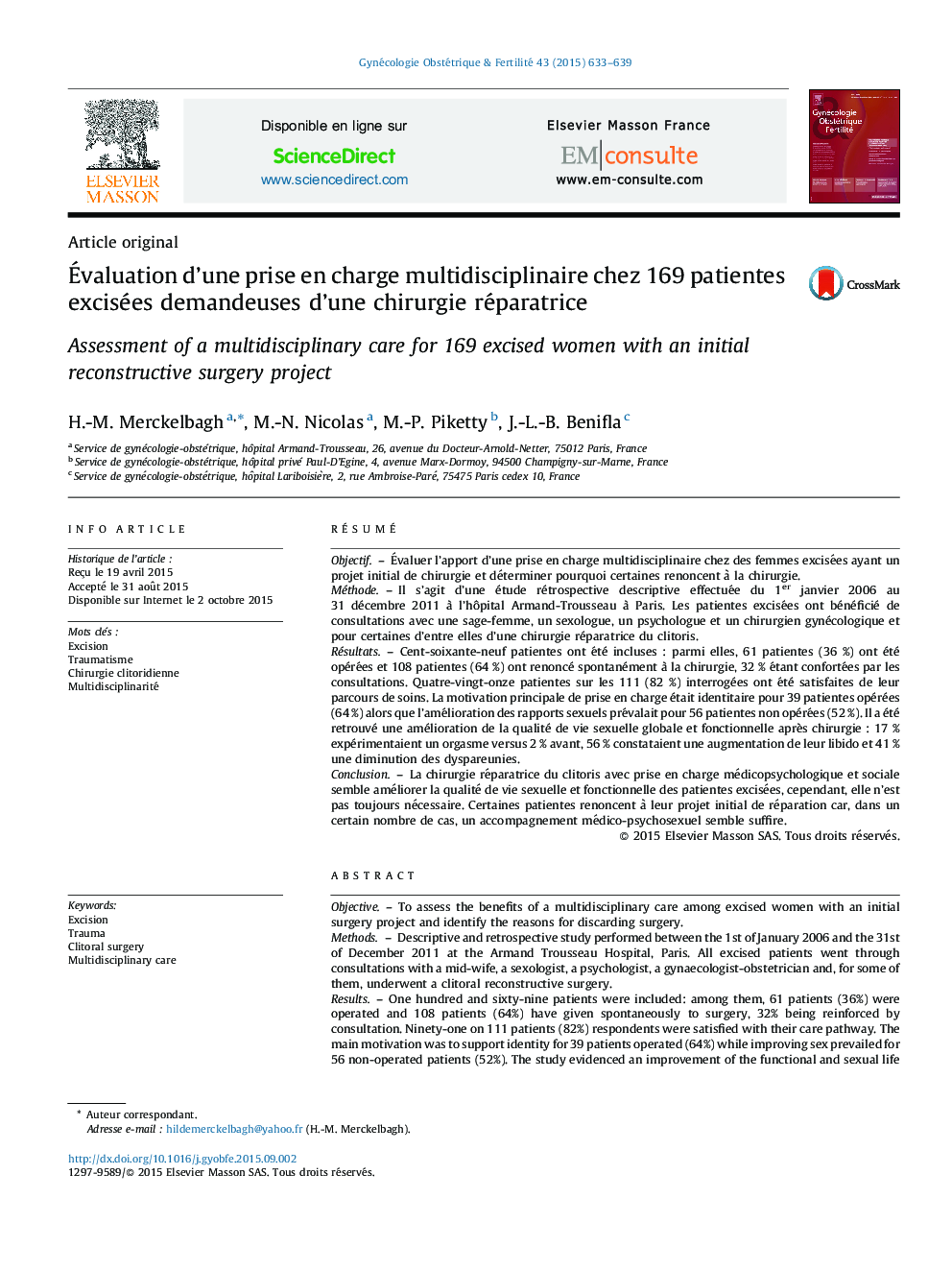| Article ID | Journal | Published Year | Pages | File Type |
|---|---|---|---|---|
| 3947928 | Gynécologie Obstétrique & Fertilité | 2015 | 7 Pages |
RésuméObjectifÉvaluer l’apport d’une prise en charge multidisciplinaire chez des femmes excisées ayant un projet initial de chirurgie et déterminer pourquoi certaines renoncent à la chirurgie.MéthodeIl s’agit d’une étude rétrospective descriptive effectuée du 1er janvier 2006 au 31 décembre 2011 à l’hôpital Armand-Trousseau à Paris. Les patientes excisées ont bénéficié de consultations avec une sage-femme, un sexologue, un psychologue et un chirurgien gynécologique et pour certaines d’entre elles d’une chirurgie réparatrice du clitoris.RésultatsCent-soixante-neuf patientes ont été incluses : parmi elles, 61 patientes (36 %) ont été opérées et 108 patientes (64 %) ont renoncé spontanément à la chirurgie, 32 % étant confortées par les consultations. Quatre-vingt-onze patientes sur les 111 (82 %) interrogées ont été satisfaites de leur parcours de soins. La motivation principale de prise en charge était identitaire pour 39 patientes opérées (64 %) alors que l’amélioration des rapports sexuels prévalait pour 56 patientes non opérées (52 %). Il a été retrouvé une amélioration de la qualité de vie sexuelle globale et fonctionnelle après chirurgie : 17 % expérimentaient un orgasme versus 2 % avant, 56 % constataient une augmentation de leur libido et 41 % une diminution des dyspareunies.ConclusionLa chirurgie réparatrice du clitoris avec prise en charge médicopsychologique et sociale semble améliorer la qualité de vie sexuelle et fonctionnelle des patientes excisées, cependant, elle n’est pas toujours nécessaire. Certaines patientes renoncent à leur projet initial de réparation car, dans un certain nombre de cas, un accompagnement médico-psychosexuel semble suffire.
ObjectiveTo assess the benefits of a multidisciplinary care among excised women with an initial surgery project and identify the reasons for discarding surgery.MethodsDescriptive and retrospective study performed between the 1st of January 2006 and the 31st of December 2011 at the Armand Trousseau Hospital, Paris. All excised patients went through consultations with a mid-wife, a sexologist, a psychologist, a gynaecologist-obstetrician and, for some of them, underwent a clitoral reconstructive surgery.ResultsOne hundred and sixty-nine patients were included: among them, 61 patients (36%) were operated and 108 patients (64%) have given spontaneously to surgery, 32% being reinforced by consultation. Ninety-one on 111 patients (82%) respondents were satisfied with their care pathway. The main motivation was to support identity for 39 patients operated (64%) while improving sex prevailed for 56 non-operated patients (52%). The study evidenced an improvement of the functional and sexual life quality after surgery: 17% experienced an orgasm versus 2% before surgery, 56% reported an increase in their libido and 41% a decrease in dyspareunia.ConclusionClitoral reconstructive surgery with multidisciplinary care tends to improve the functional and sexual life quality of excised patients, though it is not always necessary. Some of the patients discard their initial project of reconstructive surgery as in some of the cases, a multidisciplinary care only seems sufficient.
